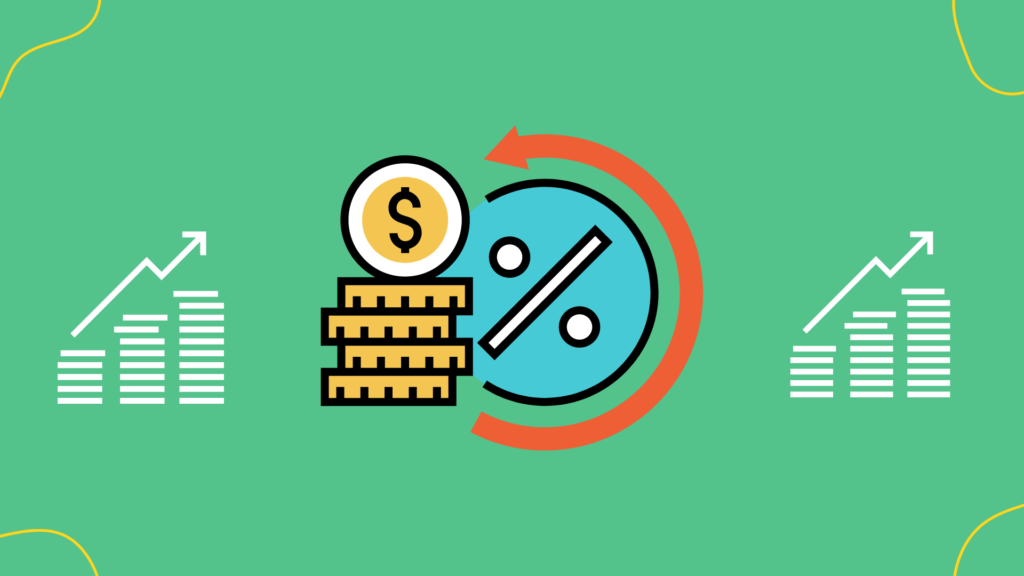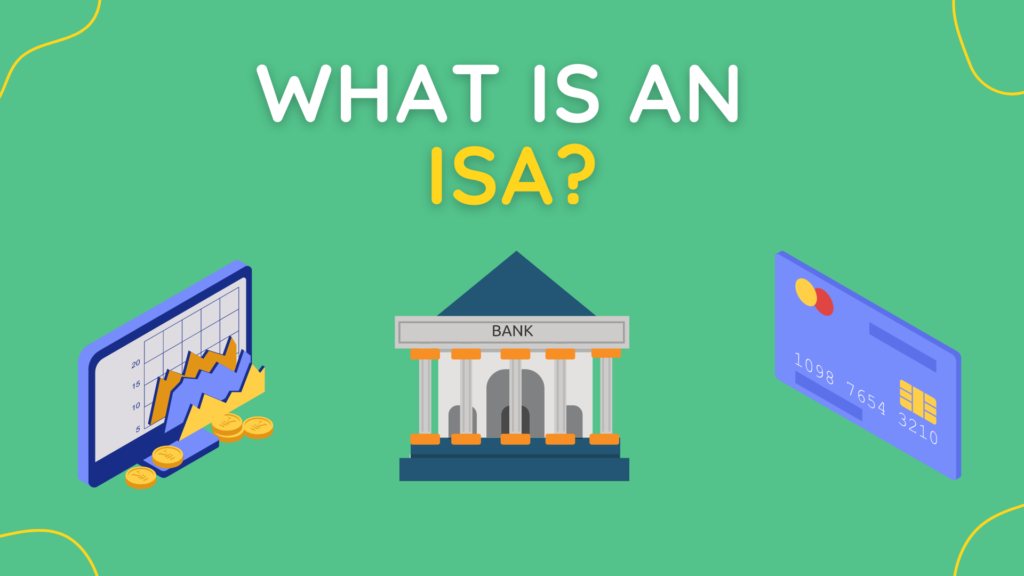
Sammie Ellard-King
I’m Sammie, a money expert and business owner passionate about helping you take control of your wallet. My mission with Up the Gains is to create a safe space to help improve your finances, cut your costs and make you feel good while doing it.
You’ve landed here because you’re looking for ways to make your money go further.
You could be looking to save for a house deposit, save money, retire or invest. If that’s you then you’ve come to the right place.
But what is an ISA and how does it benefit me to have one?
Table of Contents
What is an ISA?
ISA or Individual Savings Accounts are tax-efficient ways of saving and investing your money.
There is four different types of ISA worthy of note which have very different benefits and rules associated. These four types include:
- Innovative Finance ISAs
- Help To Buy ISAs
- Ethical ISAs
These little beauties offer UK residents a tax-free way to grow your money and allow you to keep a lot more of your investment returns than you would in a normal brokerage account.
First opened in 1999 ISA accounts have fast become a popular place for investors and savers across the UK.
We believe that everyone should have at least one of these ISA and I know people with all four. Essentially why would you want to give your money to the taxman?
The only thing is there is a limit that you can use each tax year so in this article we take you through the rules and benefits of each ISA.
In this ISA Guide, we’ll outline what is an ISA and what types of ISA are best for you.
How Much Can You Put In An ISA?
The ISA yearly limit sits at £20,000 for all ISAs combined other than the Junior ISA which has a separate £9,000 allowance.
This is subject to review and it is said the chancellor will be shaking things up in the upcoming Autumn budget this November.
🎙️ Listen To This 🎙️
Join us with award winning personal finance creator Timi Merriman-Johnson.
We discuss the ins and outs of ISAs, when to use ISAs, how to build good money habits and so much more.
Get the full episode by clicking Timi’s name just above or hit the play button below to listen whilst you read on.
Cash ISA Guide
A Cash ISA is essentially a savings account. The difference is that you don’t pay tax on your interest.
In traditional savings accounts with a bank or building society, any interest you earn over £1000 is subject to income tax. To open a Cash ISA you must be a UK resident and over 16 years of age.
There are really only benefits to holding a cash ISA if your interest is higher than £1000 a year. That being said, it is still a very good option if you plan on depositing large amounts and holding them there for over a year.
Just like you find in traditional savings accounts there are different types of Cash ISA’s available to you.
Instant access:
You can pay into this account at any time and equally withdraw money when you need it. A lot of accounts pose limits on how much can be withdrawn but you can find flexible ones too. It’s important to look for a flexible account with the highest available interest rates.
Regular Savings:
These accounts will have a fixed rate of interest per annum usually set over a period of time but do require a fixed amount to be deposited into the account each month. Each account is different so again look for the best deal available to you.
Fixed-Rate:
As the title suggests you will receive a fixed yearly rate of interest but these accounts will require you to lock your money away for a period of time. With these accounts, they usually pay more in interest the longer your money is fixed with them.
How much can I deposit in my Cash ISA each year?
Cash ISAs allow you to deposit £20,000 each year. This has been extended for the tax year 2022-2023.
Can I have more than one Cash ISA?
You’re only allowed to have one Cash ISA at any one time. You can transfer your ISA but it’s important to check which type of ISA you’ve taken and ensure that you’re not tied into a fixed term before attempting to do so.
Stocks and Shares ISA Guide

A Stock and Shares ISA or Investment ISA as it’s also known allows you to invest your money in stocks, bonds, commodities and real estate.
The beauty of these accounts is you don’t need to pay capital gains tax on any income you make from profits.
This means that minus any fees you might incur from your investments you keep everything you make. The risk with these accounts is you can always get back less than what you put in as the stock market provides no guarantees.
If you select the right investments then over the long term your account can create a solid return.
It’s important to do your research into the investments you make and even consult professionals to help with your choices should you not be comfortable choosing your own.
There are three main types of Stocks and Shares ISA. These are:
- Self Invested ISAs
- Expert Managed ISAs
- Ethical ISAs
You can also check out exactly how much money you could potentially make over a number of years via our compound interest calculator.
Investments can also give you a much larger return than what you can get from an interest in a Cash ISA. We talk about this in our post Cash ISA vs Stocks and Shares ISA.
There’s always a risk so it’s important to establish your risk tolerance and work towards an end goal such as retiring early or a deposit on your first home.
How much can I deposit each year?
Just like the Cash ISA, you can invest £20,000 per annum tax-free.
What are managed stocks and shares ISA accounts?
A managed ISA is where you employ a person or company to invest the money for you. They will often spend time with you to establish your own financial goal and risk tolerance.
How old do I have to be to open a stocks and share ISA?
The current rules in the UK mean you need to be 18 to open an investment ISA.
Which stocks and shares ISA is best?
There are 100s of different companies within the UK that offer stocks and shares ISA. It comes down to personal preference and what company you feel most comfortable with. It’s important to do your research when placing your money with a company.
Reputation and their products are a good place to start. Look for reviews, Trust Pilot ratings and even check out Glassdoor to see how they treat their employees.
Are Stocks and Shares ISAs worth it?
Stocks and Shares ISAs are worth it if individuals plan to utilise their tax-free allowances. It’s also important to think longer-term as Stocks and Shares ISAs are often not really suitable for day trading.
Lifetime ISA Guide
A Lifetime ISA is very different to the accounts above and was created by the UK government to help individuals purchase their first home or improve their retirement pots.
The government offers you £1 for every £4 you put in (25%) up to the value of £1000 per year. This means that if you put in £4000 (which is also the max per year) the government will add £1000.
Whilst this might sound incredible and just like getting free money (which it certainly is), there are a good few rules you need to adhere to otherwise you could actually be out of pocket.
You can also invest the funds in your Lifetime ISA and keep all the gains you make. This means that you could be investing money that you’re given for free which provides opportunity.
We’ve made a list of the rules you need to stick to below:
- You must be 18 to open an account but under 40.
- You can make contributions to your Lifetime ISA up until your 50th birthday.
- £4000 per year is the limit for each account.
- If purchasing a property with the money it must be your first property and not a second home.
- The property you buy cannot be more than £450,000.
- The property you buy must be bought with a mortgage.
- Your Lifetime ISA must be open for a minimum of 12 months before you use the money.
- You must appoint a solicitor on your behalf to make the purchase of the property.
- Should you be using the money for retirement you must be 60 years old before you use the money.
- If you withdraw early you lose all the money that the government put in plus an extra 25% of the money you have put in.
- The Help to Buy ISA closed in 2019 and so this is now your only option for support from the UK government.
- You can access the money if declared terminally ill.
You can check out our mortgage calculator here to understand affordability.
Junior ISA Guide
Junior ISAs allow you to give your children a tax-free head start in life. You can open a Junior ISA for each of your children if they’re under the age of 18. This money can be kept in cash or invested and you also keep all of the gains you may receive.
You can put up to £9,000 per annum tax-free into your junior ISAs. There are two types of Junior ISA either a Junior cash ISA or a Junior Stocks and Shares ISA.
Both have the same yearly limits (£9,000) but follow similar parameters to the accounts listed above.
Unlike your own adult ISA where you can open a new one each tax year, you can only have one Junior Cash ISA and one Junior Stocks and Shares ISA throughout their entire childhood.
It’s important to note that the funds inside are not yours and are your children only. Once they reach 18 they can decide for themselves what they want to do with the money.
They can either access the funds or convert them into an adult ISA and continue with their own contributions in a tax-efficient way.
Who can open an account for a minor?
This must be a parent or appointed legal guardian responsible for the child in question.
Do the contributions affect my own tax-free contributions?
No, it doesn’t. Essentially this isn’t your money once it’s put inside so it’s very important to remember that.
Innovative Finance ISAs
There is a final type of ISA that needs to be mentioned and that’s IFISAs. These types of ISAs are not as common as the main four types but they do exist.
Essentially innovative finance ISAs allow the account holder to lend money via peer-to-peer (p2p) lending.
This practice is generally considered higher risk and that’s why there are limited products available that allow you to do this.
Equally the FCA have rules in place that make these products available to higher net worth or more experienced investors only.

FAQs
Can you have more than one isa?
You can have more than one ISA product as long as you’re meeting the requirements for each type. Often you can only contribute to one ISA within a type per year.
For example, if you have two Stocks and Shares ISAs then you can only contribute to one of those each tax year.
Can you have a Cash ISA and Stocks and Shares ISA?
Yes you can. They are different types of ISAs that have very different functions but the total allowance remains at £20,000 that you can put into both per year.
Many experts advise that for short term goals open a Cash ISA and for longer term goals look into a Stocks and Shares ISA.
When is interest paid on an ISA?
Can you inherit an ISA?
Yes, you can inherit an ISA. Since April 2015, if you inherit money though an ISA this does not contribute to your tax allowance of £20,000 for that tax year.
You can re-invest the inherited money but note if you withdraw the money and then re-invest it then it would count towards your tax allowance for that year.
Conclusion
Overall you can clearly see the value of contributing to one or more of these accounts. Saving on taxes and growing your own financial pots are the fastest way to create yourself or your family a better future.
I personally own both a Cash ISA and a Stock and Shares ISA and contribute to both regularly.
I use my Cash ISA as my emergency fund and do not use the fixed term options because of this. I’d like access to my money but may opt to change this if my financial situation improves in the future.
My Stocks and Shares ISA I contribute to religiously each month and invest in a number of stocks, ETFs and index funds.
Now we hope you now understand ‘What is an ISA’ and what type best suits your needs.
The tax treatment depends on your individual circumstances and may be subject to change in the future subject to UK law.
Please remember the value of your investments can go down as well as up, and you could get back less than you put in.
You should seek financial advice if you’re unsure about investing. The products featured on this page contain affiliate links and different T&C’s will apply with each product.
Share this article with friends
Disclaimer: Content on this page is for informational purposes and does not constitute financial advice. Always do your own research before making a financially related decision.




